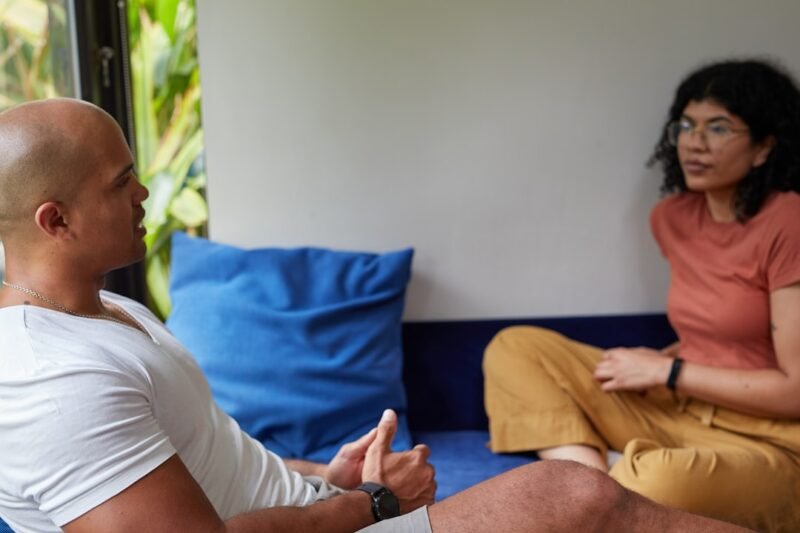Long-term mentoring in relationships is a topic that deserves our attention.
In a world where quick fixes are often sought after and even the norm, it’s crucial to understand why they fail when it comes to building and maintaining relationships.
In this article, we delve into the case for long-term mentoring, highlighting some of the pitfalls of quick fixes and the benefits of investing in sustained guidance and support.
I basically argue for exploring the importance of taking a long-term approach to relationship growth and offer some ideas into why it can lead to more fulfilling and lasting connections compared to quick fixes and popular (but often misguided) pop psychology.

The Allure of Quick Fixes
As a relationship mentor to many people over the years, I’ve seen how tempting quick fixes can be in our fast-paced world.
As people, we all want immediate solutions to our relationship (and other) problems.
So, I understand the appeal of turning to social media advice, self-help books, or friend recommendations.
In fact, in many cases, these can be very helpful …. especially when they don’t stand in isolation.
However, I’ve also learned that many of these quick solutions rarely last because they often only address the symptoms, not the root causes.
For example, when some experts tell couples to “just communicate better,” they sometimes overlook the deeper issues causing their misunderstandings.
Also, I’ve noticed that quick fixes can sometimes trick us into thinking we’ve solved our problems, especially if there’s an immediate ROI.
But, in reality, we’re just putting a bandaid on a deeper wound.
That’s why I’ve started advocating for long-term mentoring instead.
Following a longer-term approach puts us in a better position to understand the complexities of a relationship.
Through my experience over the years, I’ve seen and come to understand how investing time in something like mentoring can help couples develop better insights into their behaviours because we’re essentially pursuing lived wisdom rather than just learned knowledge.
And that has far more value, in my opinion.
Why Quick Fixes Fail
While self-help books, apps, and single therapy sessions seem convenient and sometimes necessary, they often fail to address the real issues in a relationship.
For example, consider why self-help books often fall short.
They typically offer general advice that might not fit your specific situation.
However, each relationship is unique; what works for one couple might not work for another.
Relationship apps often face similar limitations.
Yes, they might help you track your mood or remind you to send loving messages.
However, they can’t help you develop the deeper understanding needed for lasting change.
In that instance, you need someone to guide you.
Someone who speaks from a place of wisdom because they’ve walked the path, not just read about it.
They know what to ask, what to consider, how it feels, and most of all, they offer support.
You do not need another self-help book or a twenty-something-year-old life coach who is single, has never had a real relationship past a few months, and only knows how to get the guy or girl but not keep them.
And I’m not even talking about when real tough stuff like illness, death, parenthood, addiction, financial challenges, mental health issues, building a life together, and so on.
Quick fixes almost always come apart fairly quickly when it comes to the true challenges of life.
It would help if you had more…
The Role of Marriage Mentoring: A Holistic Approach
In essence, marriage mentoring is an innovative approach designed to enrich and sustain the dynamics of a marital relationship by fostering healthy communication and encouraging personal growth through lived wisdom.
Differently put, mentorship is about guidance, not judgment.
Unlike traditional counselling methods that may focus exclusively on identifying problems and suggesting immediate solutions, marriage mentoring adopts a more comprehensive, proactive, and long-term strategy.
This holistic approach integrates both partners’ needs and aspirations, laying the foundation for lasting emotional and relational health.
At its core, marriage mentoring emphasizes the importance of relational dynamics.
Also, like therapists, mentors provide a safe and supportive environment wherein couples can openly discuss their challenges and triumphs.
This open dialogue serves as a springboard for deeper understanding and empathy within the relationship.

Where it differs from therapy or even coaching is that mentors often share their own experiences, providing real-life examples and valuable insights drawn from their journeys.
In other words, mentors venture beyond theory and research – they tap into lived experience, which often either validates science or proves it to miss the mark somewhat.
For instance, I grew up with the notion that one should never go to bed angry, meaning things should be talked out before you go to sleep.
Yet, my experience has always contradicted this in that there have been numerous occasions where time and distance were a much more necessary option than forcing a conversation.
In many cases, time proved that to be the wiser choice as what seemed to be an issue before magically resolved itself overnight.
That experience, I’ve come to learn, however, is also backed up by some relationship researchers after all.
Mentoring in relationships, therefore, encourages and cultivates a sense of shared wisdom among all participants, helping couples navigate the complexities of their partnership with greater ease.
Moreover, marriage mentoring typically prioritizes ongoing communication, a critical element that is frequently overlooked in more transactional solutions such as quick fixes.
While these immediate interventions can offer temporary relief, they often fail to address the root causes of relational discord.
In contrast, marriage mentoring encourages couples to engage in continuous dialogue, fostering a culture where both partners feel heard and valued.
This commitment to growth usually nurtures resilience over time, allowing couples to develop adaptive strategies that enhance their relationship’s stability.
Ultimately, marriage mentoring offers a sustainable framework for couples seeking long-term improvements in their relationship.
By focusing on exploratory dialogue and mutual growth, mentors essentially serve as guides through the complexities of relationships, ensuring that couples can cultivate a deeper connection and experience enduring emotional fulfilment.
In this way, marriage mentoring stands out as a valuable alternative to quick fixes, promoting lasting relational success.
Comparing Mentoring with Traditional Therapy
I’ve already alluded to it, but when examining the differences between marriage mentoring and traditional therapy, one must consider each approach’s distinct goals, methods, and outcomes.
Traditional therapy often focuses on understanding and changing maladaptive thoughts and behaviours, which may involve addressing specific past traumas.
Traditional therapy may involve psychological assessments and often delves into the emotional and relational histories of individuals within the context of their personal experiences to address cognitive and behavioural maladaptions (I would call it).
This introspective nature allows clients to gain insight into their behaviours and feelings, ultimately working through unresolved issues to foster personal healing.

More specifically, traditional marriage therapy, often known as couples therapy, is usually a form of psychotherapy that aims to understand and improve relational dynamics between partners.
It typically involves both partners attending sessions together with a licensed therapist.
The therapist, often trained in various psychological theories, serves as a type of mediator and guide to facilitate communication, identify underlying issues, and work towards better understanding and resolving conflicts in the relationship.
A common example of traditional marriage therapy can be found in the use of emotionally focused therapy (EFT).
EFT is a structured approach to couples therapy, highly regarded for its focus on emotional bonding and adaptability based on attachment theory.
The objective of EFT is to expand and reorganize key emotional responses, create a shift in partners’ interactional positions, and initiate new cycles of interaction that strengthen the attachment bond.
Consider a couple, Alex and Jamie, for example, who frequently argue about trust and financial issues, leading to emotional distance and frequent miscommunication.
During their therapy sessions, the therapist would begin by exploring the underlying emotions and expectations each partner holds.
Through structured dialogues, the therapist would prompt introspection, encouraging Alex and Jamie to articulate deeper, perhaps unacknowledged feelings, such as fear of abandonment or inadequacy, often triggered by other things like finances.
As the sessions progress, the therapist would guide the couple in recognizing and interrupting their negative communication cycle(s), not unlike “pattern interrupts” often taught and used by Tony Robbins1.
For instance, if Alex reacts with anger when feeling insecure about financial contributions, which in turn makes Jamie withdraw, this cycle is explicitly identified and explored.
By learning to acknowledge each other’s emotions and change their interactions in response to that, Alex and Jamie can begin to practice expressing vulnerabilities safely, encouraging and growing more empathy and connection between them.
Through additional sessions, the therapist can help them practice new patterns of communication and understanding, equipping them with tools to resolve conflicts more effectively and deepen their emotional bond.
Alongside this, the therapist might also draw on techniques from other therapeutic models, such as cognitive-behavioural therapy (CBT), to address specific behavioural disputes or maladaptive thought patterns, also called cognitive distortions like “black-and-white” or all-or-nothing thinking.

In contrast, the mentoring in relationships approach emphasizes proactive techniques and actionable strategies aimed at achieving specific relationship goals.
Instead of psycho-analysing and unpacking past events with no apparent purpose, mentoring typically helps couples concentrate on their present circumstances and future aspirations.
As a result, mentors will guide couples through various relevant areas of their situation, like effective communication, conflict resolution, and shared decision-making, to equip them with valuable tools to reinforce their partnership.
Now, the reason mentoring in relationships can be a powerful option for couples seeking help is because mentors typically function more like supportive guides than experts (although they are that too through lived experience).
In essence, mentors are in the trenches with the couple, offering wisdom gained from their own experiences.
Mentors often acquire and pull on their knowledge from various sources, including personal experiences and wisdom, guidance from other experts, workshops or seminars, books, and staying up-to-date with the latest research and literature in the field.
This continuous learning process enables mentors to provide valuable insights and practical advice to couples seeking guidance in their relationships.
A key word here is “wisdom” – wisdom is essentially the deep understanding and insight gained through lived experiences and continuous learning. This cannot be bought or rushed.
Another notable difference between mentoring and therapy is their respective structures and durations.
Traditional therapy may involve a longer commitment, as it often necessitates frequent sessions over an extended period to explore deep emotional issues.
Conversely, mentoring programs tend to be more structured and time-bound, typically lasting for several sessions or months. However, mentoring can also span longer periods of time.
These programs aim for quick progression, with mentors providing specific guidance that couples can implement relatively quickly.
Outcomes also diverge between the two approaches.
While therapy may result in profound personal transformation and self-discovery, mentoring tends to yield more immediate improvements in relationship dynamics.

Couples who engage in mentoring often report enhanced relationship satisfaction and clarity as they work collaboratively toward common goals.
Again, that is a key concept – collaboratively.
The collaborative nature of mentoring is perhaps the key aspect that sets it apart from many other processes.
In mentoring, couples actively work together with their mentors to achieve common goals and improve their relationship dynamics.
As a result, mentoring often leads to immediate improvements in relationship satisfaction and clarity, with couples reporting enhanced outcomes through collaborative efforts.
Another significant difference between these processes worth mentioning is the nature of the relationship between the therapist/client versus the mentor/mentee.
In therapy, there is often a clear power dynamic, with the therapist holding a position of authority and the client relying on the therapist for guidance and support.
This can give rise to frequently discussed issues like transference and disclosure, where the client may project their feelings onto the therapist (or vice versa), or the therapist may be restricted to sharing too much of their personal life (which is a good thing in this instance).
In contrast, mentoring is characterized by a more equal and collaborative relationship, where the mentor and mentee work together as partners.
This creates (aims to) an environment that is conducive to open communication, mutual trust, and shared decision-making.
Ultimately, couples seeking to strengthen their relationship may find that mentoring, with its collaborative nature, focus on practical solutions, and future-oriented strategies, provides a viable alternative to traditional therapy’s more introspective methodology.

To be clear, not every situation warrants therapy, but often those who believe they don’t need it, need it most.
Let’s shift our focus now to a similar process and also look at some subtle differences – coaching.
Coaching vs. Mentoring: What’s the Difference?
When exploring personal and relational development, particularly within the context of marriage, it is also helpful to distinguish between coaching and mentoring.
Both approaches provide valuable support but differ somewhat in their focus and methodologies.
In essence, traditional coaching typically centres around the attainment of specific goals.
True coaching (not consulting) often comprises structured sessions where a coach helps individuals identify objectives, develop strategies, and maintain motivation towards those aims.
Much of what passes for ‘coaching’ today, especially in business, is actually some form of consulting and not coaching.
Coaching and consulting may seem similar, but they have distinct differences.
While coaching focuses on helping individuals set goals, develop strategies, and stay motivated, consulting is more about providing expert advice and guidance.
True coaching involves structured sessions and aims to empower individuals to achieve their objectives.
As a result, coaching is often results-oriented, emphasizing tangible outcomes within a defined timeframe.
To achieve that, coaches may employ various techniques, including accountability and skill-building exercises, to aid their clients in achieving their aspirations.
Again, that’s what true coaching is (or used to be).

On the other hand, mentoring takes a more holistic and relational approach.
Mentoring in relationships encompasses not only the professional or personal growth of the individuals involved but also the fostering of an emotional connection and collaborative partnership.
A mentor serves as an experienced guide who offers wisdom, insights, and shared experiences to help others navigate the complexities of their lives and relationships.
Furthermore, this mentoring relationship is typically characterized by a longer duration and a deeper level of interaction, emphasising ongoing support, emotional understanding, and personal growth rather than only achieving specific goals (although that’s also a major part of the process).
In a marriage context, therefore, we can know that mentoring has the potential to significantly enhance interpersonal dynamics between partners by encouraging empathy, effective communication, and emotional connection, which usually results in a happier, healthier, and more intimate relationship.
Unlike coaching, which may focus on immediate issues, mentoring nurtures a sustained dialogue that promotes accountability and awareness and hopefully changes over time.
Couples engaged in mentoring relationships often experience profound changes, fostering trust and a stronger emotional bond, which can lead to a more resilient partnership.
Thus, while both coaching and mentoring have their merits, the relational depth offered by mentoring in relationships provides a framework for long-term growth and connection.
And with that in mind, let’s look at a few…
Benefits of Long-Term Mentoring in Relationships
As already pointed out, long-term mentoring in relationships usually offers many advantages that are not easily achievable through quick fixes.
First and foremost, it typically promotes a profound understanding between individuals, which is why choosing the right mentor is so critical (we’ll look at this issue later).

Mentorship provides an opportunity for participants to delve deeply into each other’s thoughts, motivations, emotional landscapes, and behaviour over an extended period.
This gradual accumulation of knowledge ends up creating an environment where trust and empathy can flourish, thereby nurturing a stronger relational bond.
It also provides a massive amount of factual and relevant “data” the mentor and mentee(s) can use to assess and improve the situation.
That is then made easier through ongoing support that long-term mentoring offers, thereby facilitating potentially significant behavioural changes.
As people, when we engage in sustained dialogue and reflection, we can gain insights into detrimental patterns that may have previously gone unrecognized and build a plan to change that.
Moreover, the mentor’s guidance is also instrumental in helping the mentee navigate these complex dynamics, allowing for tailored strategies to emerge over time.
Ultimately, this process encourages a sense of accountability and encourages both parties to adapt and evolve within the relationship, leading to more lasting improvements than superficial solutions could ever achieve.
Strengthened emotional bonds are another critical benefit of long-term mentoring in relationships.
The investment of time and effort usually creates a solid foundation for emotional intimacy and greater investment in the mentoring process2, as shared experiences and challenges serve to deepen connections and encourage behavioural changes.
Participants often report feeling more secure and supported when involved in a mentoring relationship, which contributes to overall relationship stability and satisfaction.
The continuous engagement also leads to an organic flow of communication, promoting openness and reducing potential misunderstandings that may arise in more transient interactions.
Overall, the unique characteristics of long-term mentoring foster a transformative journey for both individuals involved, yielding results that are sustainable and meaningful.
Quick fixes may provide immediate relief (sometimes necessary), but long-term mentoring creates a nurturing environment for profound and lasting change in relationships.
The question now becomes, however, whether all mentoring relationships work as well and lead to the above-mentioned benefits.
The short answer is – NO.
Sorry.
Finding the Right Mentor for Your Marriage
Like all relationships, it’s about connection; some people will simply not connect with you.
So, choosing the right mentor for your marriage is a crucial first step in fostering a healthy and long-lasting relationship.
When seeking mentoring in relationships, as a couple, you should consider a range of factors to ensure compatibility and effectiveness and also not care about making changes if necessary.
You don’t have to keep working with someone just because you’ve already started.
So, it’s vital to evaluate your compatibility.
Couples should look for a mentor whose communication style and values align with their own.
This alignment will enhance the overall mentoring experience and facilitate open dialogue about sensitive topics.
Also, it would help if you considered the qualifications of the mentor.
That, in my mind, literally means “what makes them qualified to speak into my situation.”
That might mean finding someone with a background in relationship counselling or a related field, which could be helpful.
Absolutely, a mentor with relevant credentials can often provide evidence-based insights and strategies to help navigate our marital challenges alongside their relevant experience.
However, I want to emphasise that when searching for a mentor, it’s important to understand that mentors become mentors because of their lived experience, not just their credentials or degrees.
For instance, there are so many twenty-something-year-old life coaches with certifications and even degrees but minimal life experience – can they truly mentor you from a place of practice and wisdom rather than only book knowledge?
I believe NOT.
I would never have had someone mentor me in moving forward after my heart attack who has never had one and has done it themselves.
The stakes were too high. Theoretical ideas and opinions weren’t enough. I wanted answers and had pressing questions that books and videos didn’t help me with.
Yes, I can make an argument for young life coaches or unmarried marriage coaches because actual coaching, in essence, is about listening and asking good questions that lead a person forward – you don’t necessarily need real experience; just an ability (skill) to listen and ask good questions.
However, mentoring is something else.
Although using similar coaching skills (listening and asking good questions), mentoring is supposed to bring more to the table – lived experience.
That’s the wisdom component.

However, as said before, you also need a connection with someone.
And that’s where shared values can lead to a more meaningful connections, as both parties understand the underlying principles that guide their decisions and actions within the relationship.
You essentially operate from the same framework, so to speak.
That will also make establishing clear goals and expectations easier, which is also essential in the mentoring process.
From the get go, couples should engage in discussions with their chosen mentor about what they hope to achieve through this relationship.
That may include specific concerns they want to address or broader objectives such as improving communication skills or deepening emotional intimacy.
By outlining these goals, the couple and the mentor can stay focused and measure progress over time. It will also tell you if the mentor is the right person to get you where you want to go.
Furthermore, it is beneficial to look for mentors who emphasize long-term commitments rather than quick fixes.
Mentors who aren’t interested in investing in you long-term as someone “journeying” with you are probably not the right person you’re looking for – unless that is what you’re looking for, of course.
At the end of the day, many relationship issues are complex and require ongoing support if you don’t have the skills (yet) to navigate these issues.
So, choosing the right mentor is key to getting you started in the right direction.
That should be a mentor that promotes sustained engagement and regular check-ins to provide the necessary guidance to navigate ups and downs effectively.
Ultimately, the right mentor can be a valuable resource, offering perspective and support that can lead to a stronger, more gratifying marriage.
Conclusion: Investing in Your Relationship’s Future
Mentoring in relationships can serve as a crucial antidote to the superficiality of quick fixes.
Yes, while immediate solutions may offer temporary relief and are necessary at times, they often neglect the deeper emotional and psychological needs of couples.
Mentoring, however, can provide a structured framework that encourages sustained communication, understanding, and mutual growth.
And through consistent guidance, couples can navigate the complexities of their relationship, creating a strong foundation that withstands the trials of life.
Long-term mentoring has the potential to facilitate a deeper connection between partners, enabling them to explore their individual and collective values, desires, and challenges.
The process goes beyond merely addressing surface issues; it delves into the heart of relational dynamics, allowing couples to develop a nuanced understanding of each other.
And as mentors guide couples through conflicts and milestones, they aim to cultivate essential skills such as empathy, active listening, and constructive communication, all of which are vital for the longevity and success of a relationship.
Moreover, ongoing mentorship provides opportunities for personal transformation alongside relational growth.
This journey encourages partners to support their aspirations and dreams, strengthening their emotional bond.
And as you as a couple adopt a mindset focused on continuous improvement, you not only address present issues but also build resilience against future challenges.
Ultimately, by prioritizing mentoring in relationships over quick fixes, as a couple, you can embark on a transformative journey that nurtures your connection and enriches your lives together.
This investment in long-term mentoring assures that you are equipped not only to survive but to thrive in your partnership.
Endnotes:
- As described by Tony Robbins, a pattern interrupt is a technique used to disrupt habitual behavioural patterns or thought processes. This interruption can lead to a shift in mindset, allowing individuals to break free from limiting beliefs or negative emotional states. Pattern interrupts can be implemented through various means, including surprising statements, actions, or even changes in the environment to refocus or re-engage the mind. ↩︎
- The sunk-cost-fallacy is a behavioural “economic” phenomenon where people continue with something because of the time, money, effort, or emotional energy they’ve already invested. ↩︎
